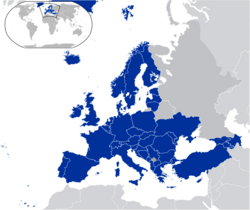
Back Raad van Europa Afrikaans Europarat ALS مجلس أوروبا Arabic لمجلس ديال ؤروپا ARY مجلس اوروبا ARZ Conseyu d'Europa AST Avropa Şurası Azerbaijani Савет Еўропы Byelorussian Рада Эўропы BE-X-OLD Съвет на Европа Bulgarian
Council of Europe Conseil de l'Europe | |
|---|---|
 | |
| Headquarters | Palace of Europe, Strasbourg, France |
| Official languages | English, French[1] |
| Type | Regional intergovernmental organisation |
| Membership |
|
| Leaders | |
| Marija Pejčinović Burić | |
• Deputy Secretary General | Bjørn Berge |
• President of the Parliamentary Assembly | Theodoros Roussopoulos |
• President of the Committee of Ministers | Dominique Hasler |
• President of the Congress of Local and Regional Authorities | Leen Verbeek |
| Legislature | Parliamentary Assembly |
| Establishment | |
| 5 May 1949 | |
Website coe.int | |
The Council of Europe (CoE; French: Conseil de l'Europe, CdE) is an international organisation with the goal of upholding human rights, democracy and the rule of law in Europe.[2] Founded in 1949, it brings together 46 member states[b] with a population of approximately 675 million as of 2023[update]; it operates with an annual budget of approximately 500 million euros.[3]
The CoE is distinct from the European Union (EU) but people often confuse the two – not least because the EU has adopted both the CoE's flag, designed in 1955,[4] and its anthem.[5] Still, no country has ever joined the EU without first belonging to the CoE.[6]
The CoE is a United Nations Observer.[7] As an international body it cannot make laws[8] but has the ability to push for the enforcement of international agreements reached by member states.[9]
The best-known entity within the CoE is the European Court of Human Rights, which functions on the basis of the European Convention on Human Rights of 1953.[10]
The CoE's two statutory bodies are the Committee of Ministers, which comprises the foreign ministers of each member state, and the Parliamentary Assembly of the Council of Europe (PACE), which is composed of members of the national parliaments of each member state.[11] The Commissioner for Human Rights is an institution within the Council of Europe, mandated to promote awareness of and respect for human rights within the member states. The secretary general presides over the secretariat of the organisation. Other major CoE bodies include the European Directorate for the Quality of Medicines & HealthCare (EDQM)[12] and the European Audiovisual Observatory.
CoE headquarters and the European Court of Human Rights are in Strasbourg. The CoE uses English and French as official languages. The Committee of Ministers, the PACE, and the Congress of the Council of Europe also use German and Italian for some work.[13]
- ^ "Did you know?". Retrieved 1 November 2022.
English and French are the official languages of the Council of Europe.
- ^ "Profile: The Council of Europe". BBC News. Archived from the original on 27 October 2022.
- ^ Council of Europe, Budget, Retrieved: 21 April 2016
- ^ "The European flag – The Council of Europe in brief". The Council of Europe. Archived from the original on 20 December 2022. Retrieved 30 December 2022.
- ^ "The European anthem – The Council of Europe in brief". The Council of Europe. Archived from the original on 4 November 2022. Retrieved 30 December 2022.
- ^ "Do not get confused – The Council of Europe in brief". The Council of Europe. Retrieved 30 December 2022.
- ^ "Intergovernmental Organizations". United Nations. Archived from the original on 2 December 2018.
- ^ "European Commission – what it does | European Union". european-union.europa.eu. Retrieved 12 February 2023.
- ^ "The role of the Council in international agreements". www.consilium.europa.eu. Retrieved 12 February 2023.
- ^ "The European Court of Human Rights - Council of Europe Office in Georgia - publi.coe.int". Council of Europe Office in Georgia. Retrieved 12 February 2023.
- ^ "Structure - The Council of Europe in brief - publi.coe.int". The Council of Europe in brief. Retrieved 12 February 2023.
- ^ "European Directorate for the Quality of Medicines and Healthcare – European Directorate for the Quality of Medicines & HealthCare – EDQM". European Directorate for the Quality of Medicines & HealthCare. Retrieved 12 February 2023.
- ^ "Headquarters and offices - The Council of Europe in brief - publi.coe.int". The Council of Europe in brief. Retrieved 12 February 2023.
Cite error: There are <ref group=lower-alpha> tags or {{efn}} templates on this page, but the references will not show without a {{reflist|group=lower-alpha}} template or {{notelist}} template (see the help page).
© MMXXIII Rich X Search. We shall prevail. All rights reserved. Rich X Search

